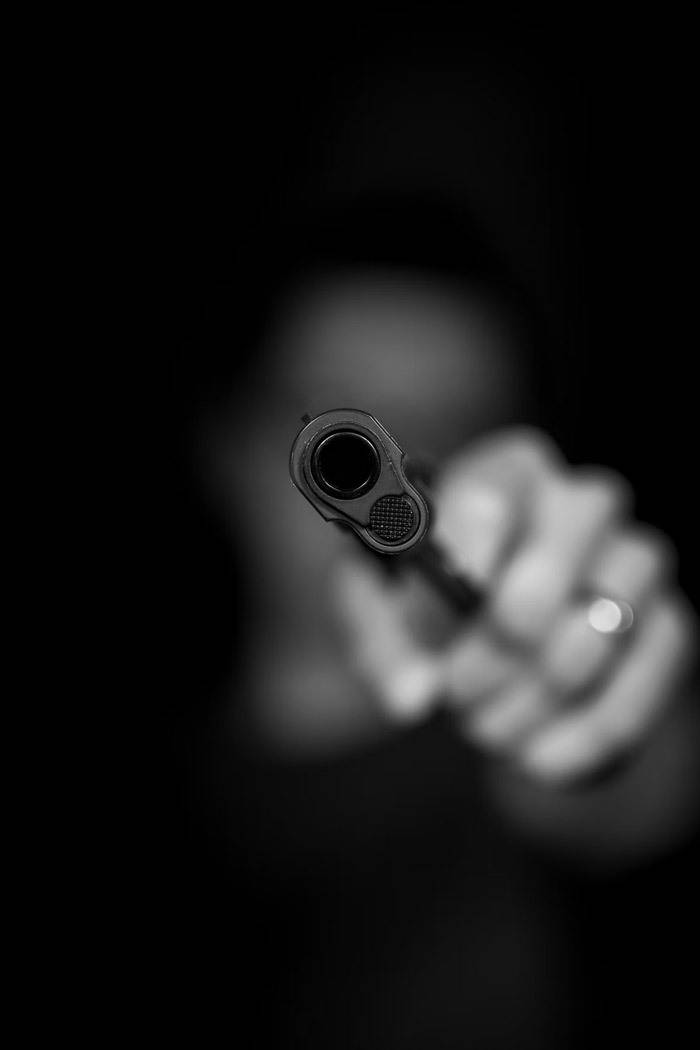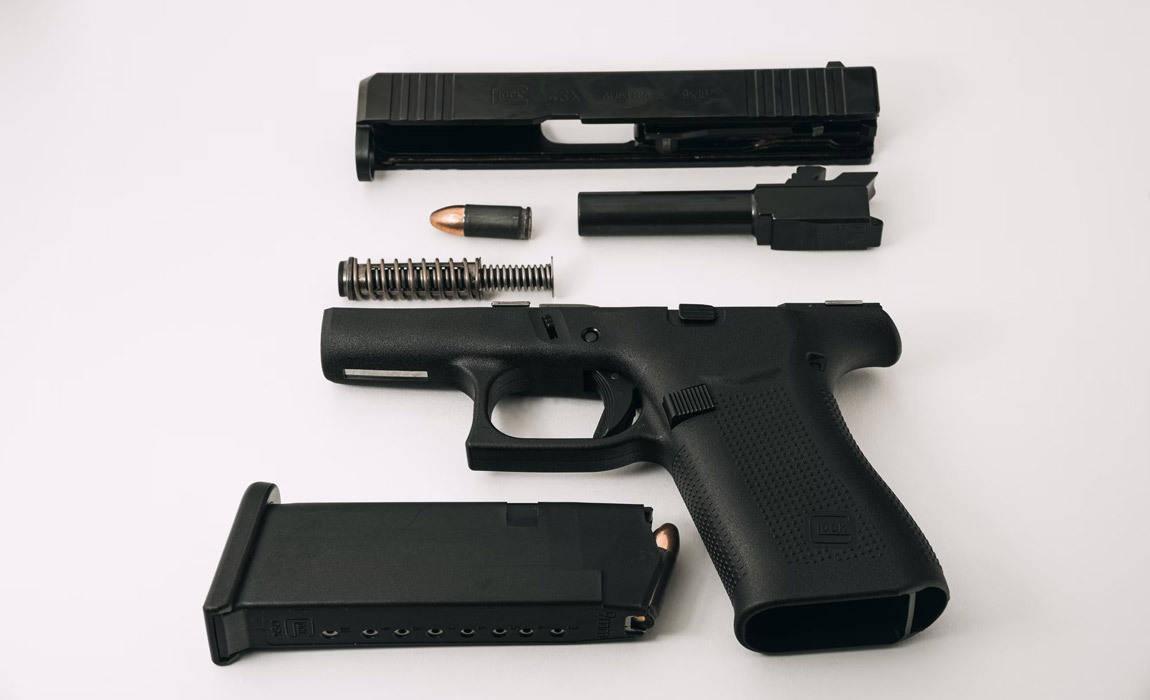The conversation around what gun to buy to protect the home often centers around the actual style of gun itself - for instance, a Glock, 1911, Barretta, etc. From there, most people pick a gun that looks good and feels good in their hand. While a home defense weapon's first benefit to the holder is that it can help inspire and project confidence simply by wielding it ... ultimately you may have to fire it and that's where ammo and caliber become extremely important since each has it's own strengths and benefits. Let's take a look at two of the most popular calibers for handguns and decide if a 9mm or 45 ACP is a better choice for your home defense needs.
A Home Defense Gun Has Different Needs Than One For Self Defense
A self defense weapon implies something that will be extremely portable and easy to carry with you in a backpack, shoulder bag, or even an on-body holster. It is something you need to be able to bring to bear quickly and in many cases it could even be something that is designed more for intimidation as a way of saying, "Stand back I'm armed!" as opposed to actually having to test how effective it's bullets are on human flesh. On the other hand, a gun that you are selecting for home defense - while still needing to be easy to hold in a stressful situation - can afford to be slightly larger with bigger bullets and stopping power. This is where the debate about 9mm vs 45 ACP becomes interesting.
This debate over which gun is best becomes even more complicated when you consider that men and women often have dramatically different physical abilities when it comes to holding and firing a firearm accurately. For instance, while a typical adult male may be able to use a higher caliber weapon to defend their home accurately, but the best handgun for women would ultimately be strongest one that she can handle accurately without worrying about absorbing a strong recoil or fatigue from carrying it.
For more than 20 years the number of guns sold in the United States has grown year over year but that number has more than doubled since 2010 with 2020 seeing 21,000,000 guns sold across the United States. While some of these may be for hunting and sporting uses, it is clear that American's are frightened and are arming themselves to protect their families and property against perceived threats. Sadly the police department is an agency that is no longer trusted the way it once was. As a result, it is very important that everyone seek proper firearms training and at least consider if buying a gun to protect their home makes sense ... and what type is best for their needs.
If you are in this process, remember that regardless of which caliber is technically better, for most home defense situations it comes down to personal preferences as to which is the right choice for his family.
A Quick Look At Popular Handgun Calibers
The handgun ecosystem in the United States is extremely diverse with a wide variety of manufacturers and variations on classic models. However, for the most part there are five main handgun calibers to consider when it comes to self defense as well as home defense.
9mm Parabellum -
This round, also known as the 9mm 19mm Parabellum is by far the most widely used caliber in the United States and was developed initially in 1901 by Austrian gunmaker Georg Luger. Today in the United States, roughly 60% of the handguns in use by police and law enforcement agencies are using 9mm. As you might expect, there are many variations of this standard caliber including being loaded with anywhere from 92-165 grains and the 9mm NATO forces round that is standardized at 124 grains therefor firing at a slightly higher pressure than the standard 9mm Luger. Additionally, there are overpressure variants paired with armor-piercing bullets that are used by military and police. Some of the most common handguns that use 9mm rounds include: Glock 19, Sig Sauer P365, Smith & Wesson Shield, Ruger LC9S, and the Barretta M9 which continues to be the official sidearm of the US Military.
Between support by law enforcement, military use by military forces in NATO countries, the US Marine Corps (as well as the rest of our armed forces), and a century of use by the German army, it is not surprising that guns designs for 9mm loads are responsible for making pistols more popular than the classic revolver as the everyday carry weapon of choice.
While a 9mm cartridge is designed to hold a lighter bullet than the ACP cartridge, in many situations this deficiency is made up because 9mm pistols can usually carry greater rounds of 9mm.
.45 ACP -
Perhaps to caliber with the most enthusiastic firearms fans on Internet forums, it is not surprising that the .45 ACP is one of the most popular choices when it comes to gun owners. the .45 ACP was developed in 1904 by John Browning and ACP stands for "Automatic Colt Pistol". However, this ammunition type earned it's place in history with the launch of the Colt Model 1911. Today, the Model 1911 and the .45 ACP are almost synonymous and it - like the 9mm - is a popular choice among military and veteran police offers who may have first experienced it in the line of duty. While the 9mm has it's passionate fans, we often see that the larger caliber .45 ACP weapons are the preferred choice by those who are actively firing them. The main reason is that guns firing this caliber are able to produce more kinetic energy from heavier bullets that ultimately will make bigger holes. However, it does this at the expense of lower magazine capacity, and more recoil.
.40 Smith and Wesson -
This caliber was the direct result of real world violence in Miami, following a 1986 FBI shootout. Following the incident, Smith & Wesson and Winchester teamed up to develop a 10mm round that worked in a semi-automatic pistol. This .40 S&W caliber is found today from a variety of different manufacturers but it is a less popular caliber compared to both the 9mm and the venerable .45 ACP.
.38 Special -
Derived from the .38 Long Colt, the .38 Special also known as .38 SPL became the iconic revolver used by police offers in the United States and is still a popular option among consumers looking for a good balance of manageable recoil, accuracy, and concealment. Additionally, it is a fairly popular choice when it comes to self defense since the weapons are usually more compact and easier to carry - though it is limited in the number of rounds that can be carried compared to other options. Regardless though, no home invader wants to face a well prepared home owner ready to defend his home with a Smith & Wesson 642 or Ruger LCR in hand.
.380 ACP -
While the .38 Special has a romantic notion from seeing it used in movies and on TV, the .380 ACP based pistols such as a Ruger LCP offer a much better option for a home owner looking for a pocket carry gun. The .380 ACP was developed by John Moses Browning and introduced by Colt in their model 1908 the .380 ACP is very easy to shoot and is a perfect option for home defense if you are looking for something lighter than a .45 ACP, which will have higher velocity, more heavy bullet, and a larger magazine compared to the .38 Special so you have the option for more follow-up shots if you need them.
.32 ACP -
As the name suggests, this is a small ammo type than even the .380 ACP. While the .32 ACP allows for a even more compact and concealable weapon than the .380 ACP it is even weaker than a 9mm in terms of velocity, muzzle energy, and ultimately stopping power.
When it comes to lightweight firearms for home defense, all of these can be a good option. However, the 9mm and .45 ACP are essentially the industry standards for a a reason. Compared to the 9mm, both the .32 ACP and .380 ACP are comparably lacking in effectiveness.

Which Caliber Is Best For your Home Defense Weapon 9mm or .45 ACP?
There are some great debates over this issue comparing the benefits of a 45 caliber handgun to 9mm and both sides offer a lot of good points. I don't anticipate making much difference in this ongoing debate but I do think it is a good idea for the firearms community to consider that both of these popular rounds work great at close range situations such as personal defense and home defense.
When it comes to the best choice for home defense, the most important things are having a gun that you know how to operate safely and accurately and that you are comfortable having it close to you at all times. Most criminals are cowards and don't want a fight. Unless cornered, simply showing that you have a gun or firing a warning shot may be enough to de-escalate the situation.
Additionally, I'm going to dismiss the .38 Special and .380 ACP caliber weapons from this discussion since while they can be excellent home defense weapons, I'd rather having something with more power and more rounds available. That being said, there is one very important scenario where a revolver is important - for folks with arthritis, the slide may be challenging to pull back because it is too stiff. Aside from the obvious benefit of a "pocket pistol" like the Ruger LCP being easily able to fit more discretely in a night stand, concealment makes little difference. The more important factor is being able to stop your intruder so they can't strike you, your family, or another innocent bystander. A home defense weapon should be designed to stop the criminal until a police officer can arrive.
Luckily there are plenty of options when it comes to both 9mm guns and .45 ACP guns and frankly it comes down to personal preference.
I'm a bigger guy who can wield a heavier weapon that offers me higher muzzle energy / velocity from a heavier bullet leading to deeper bullet penetration. Since most home defense situations involve relatively short ranges and don't usually require larger magazine options, the prime benefits of a 9mm bullet are less important to me.
However, if you are a smaller person feels more comfortable holding a lighter weapon that has more accuracy at slightly longer ranges, less recoil, and generally greater capacity magazines - these are all very good reasons to opt for a 9mm pistol such as a Beretta M9 instead.
